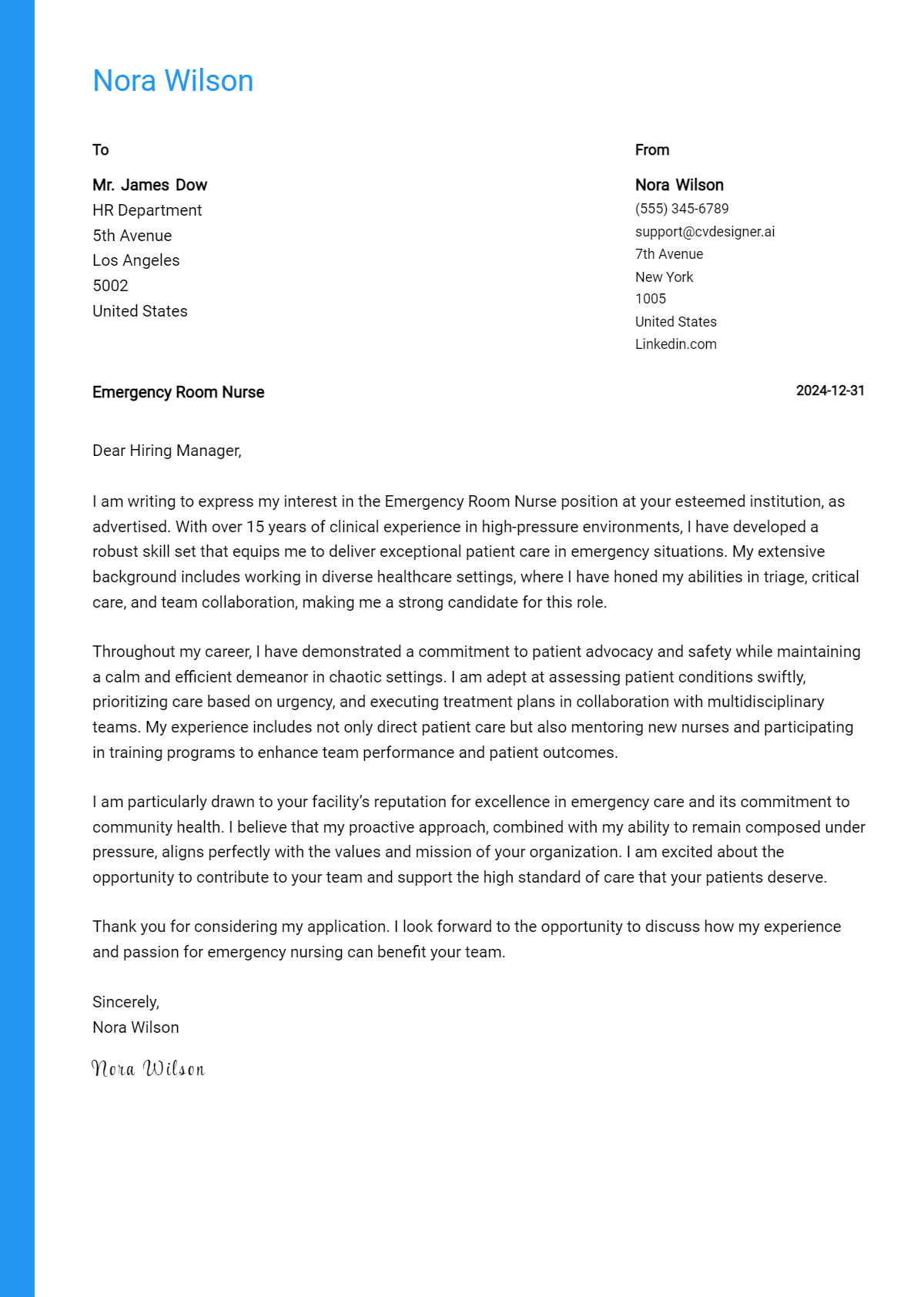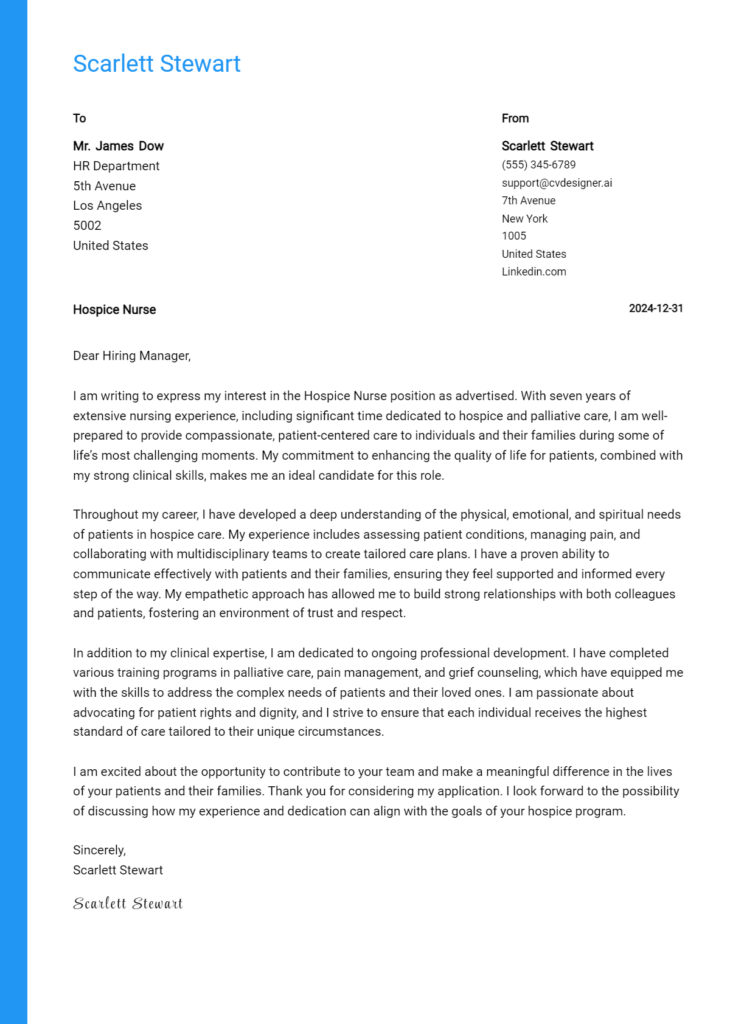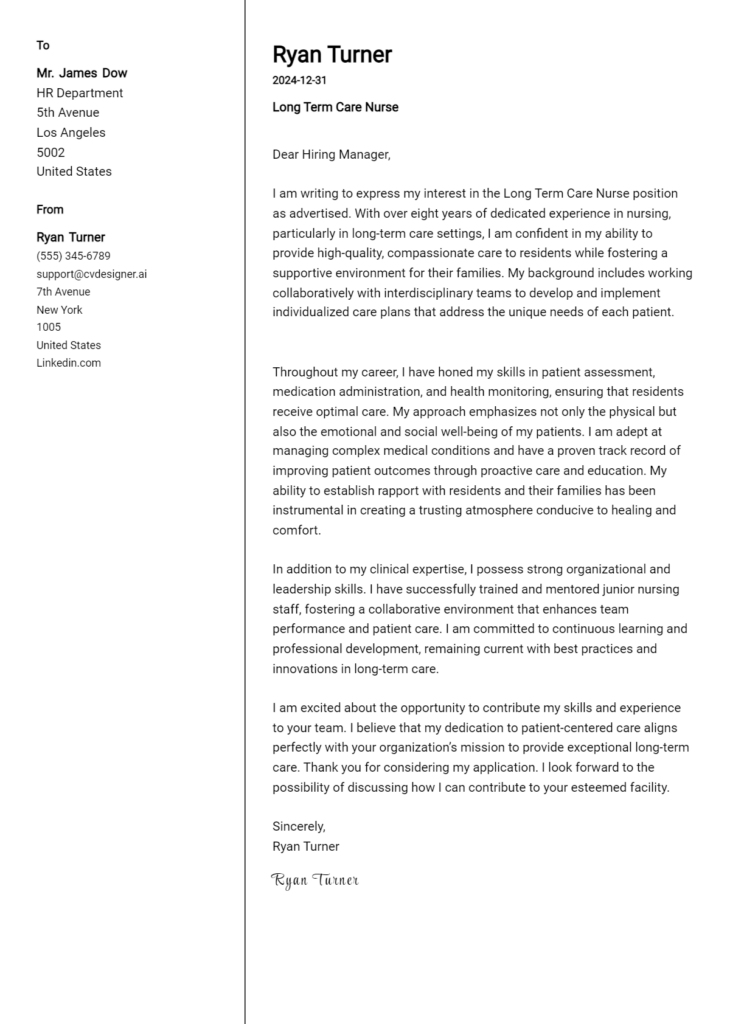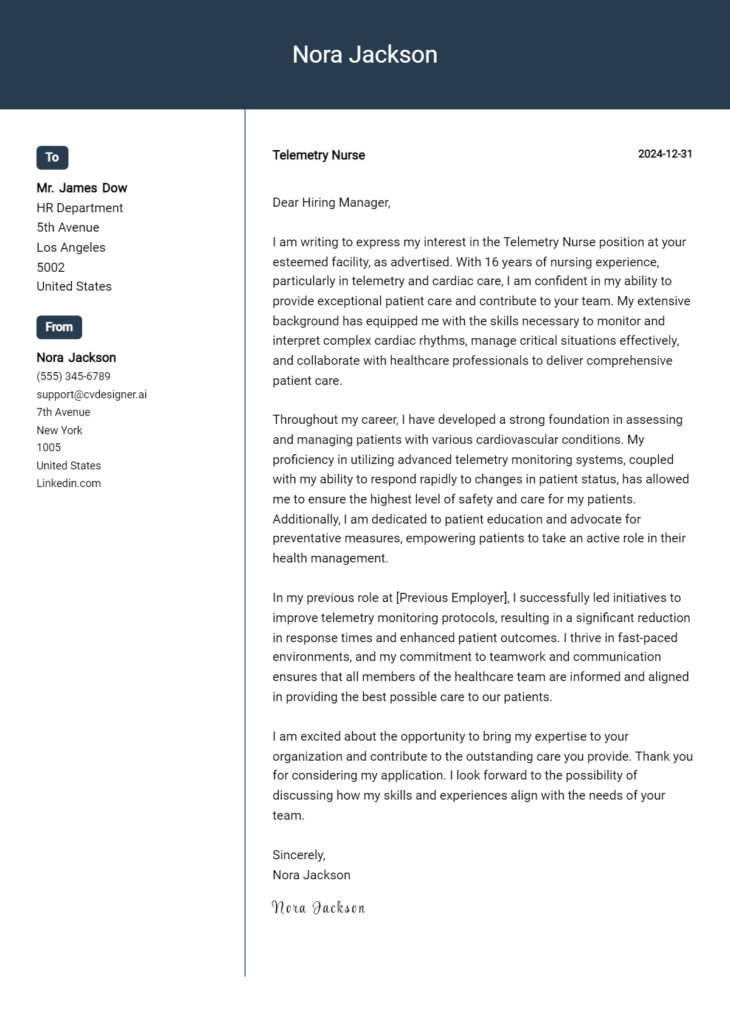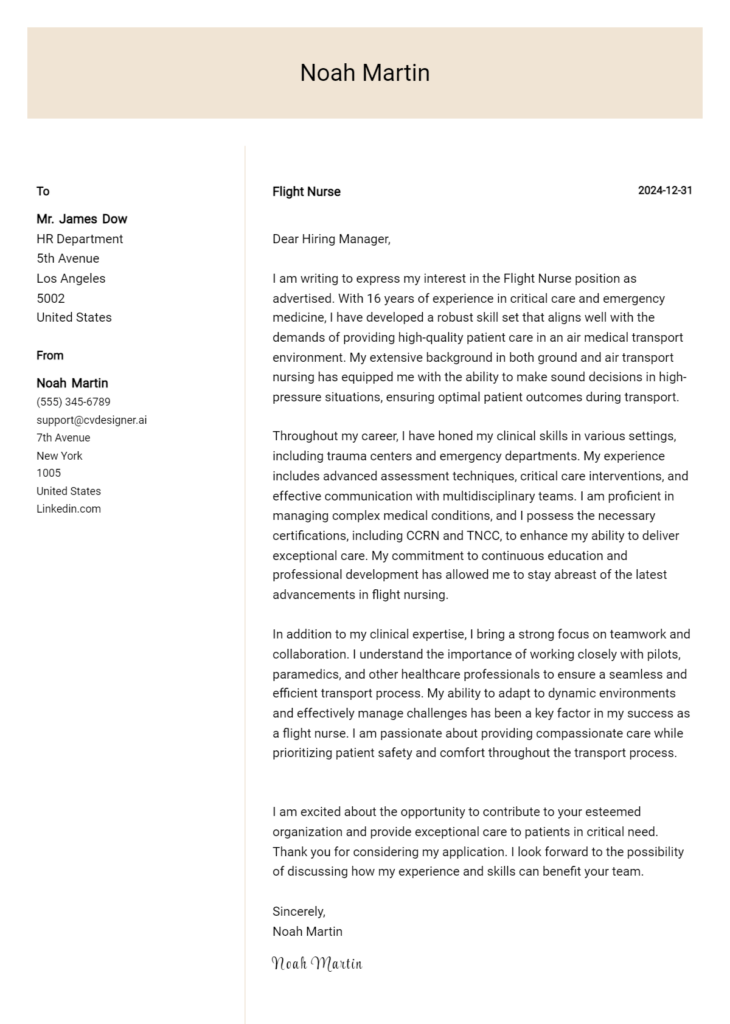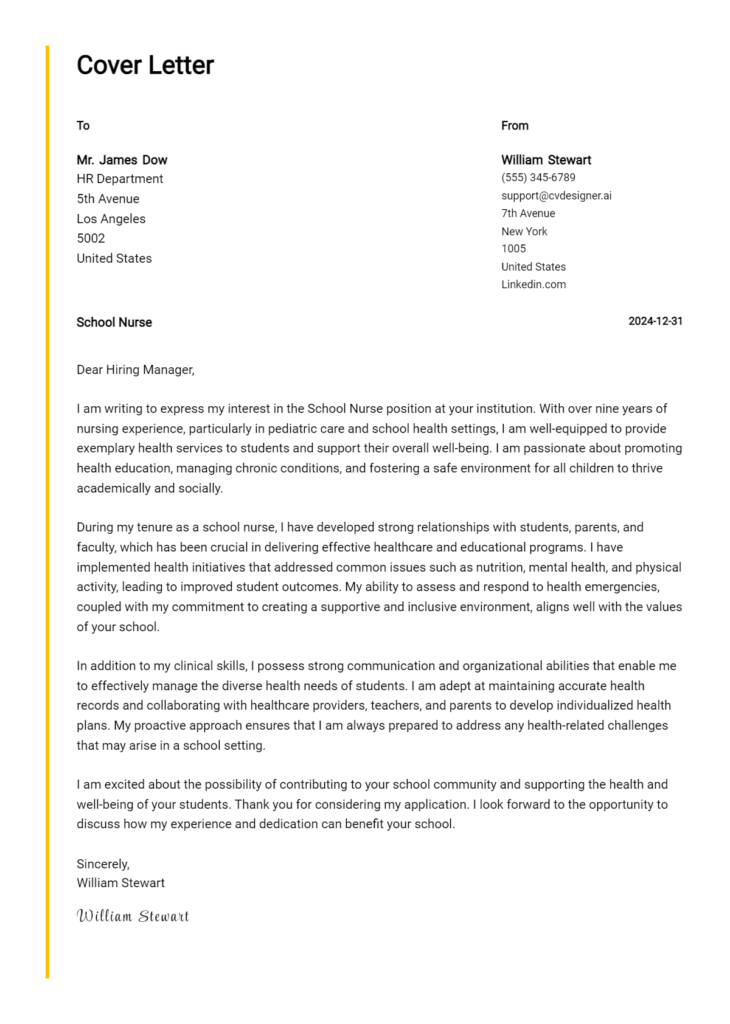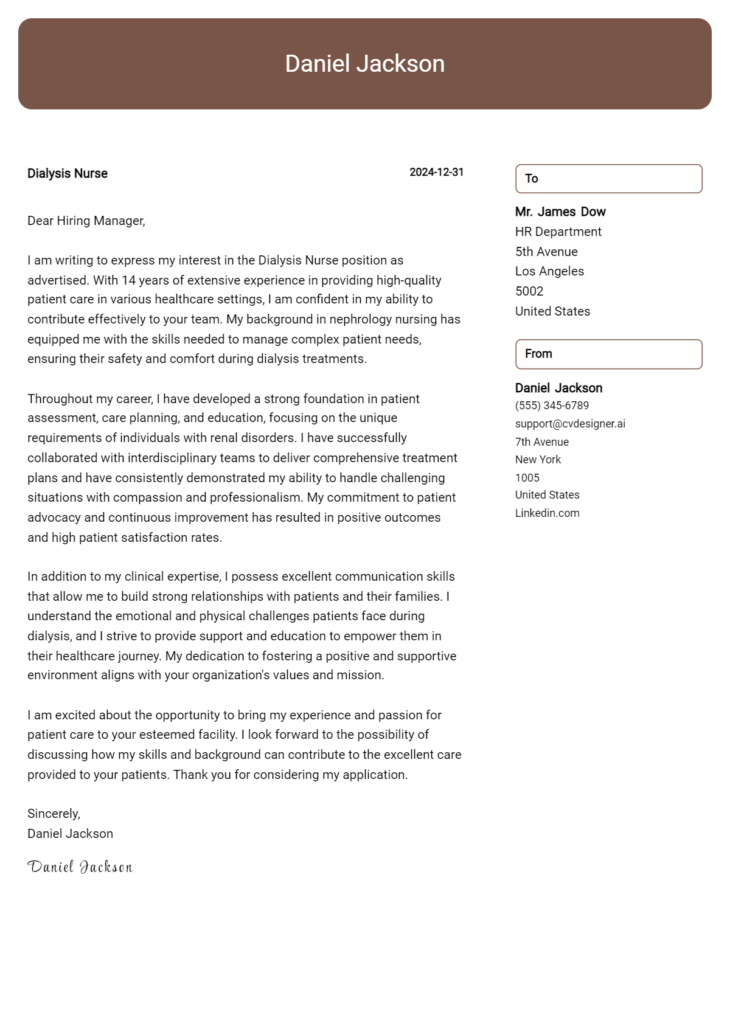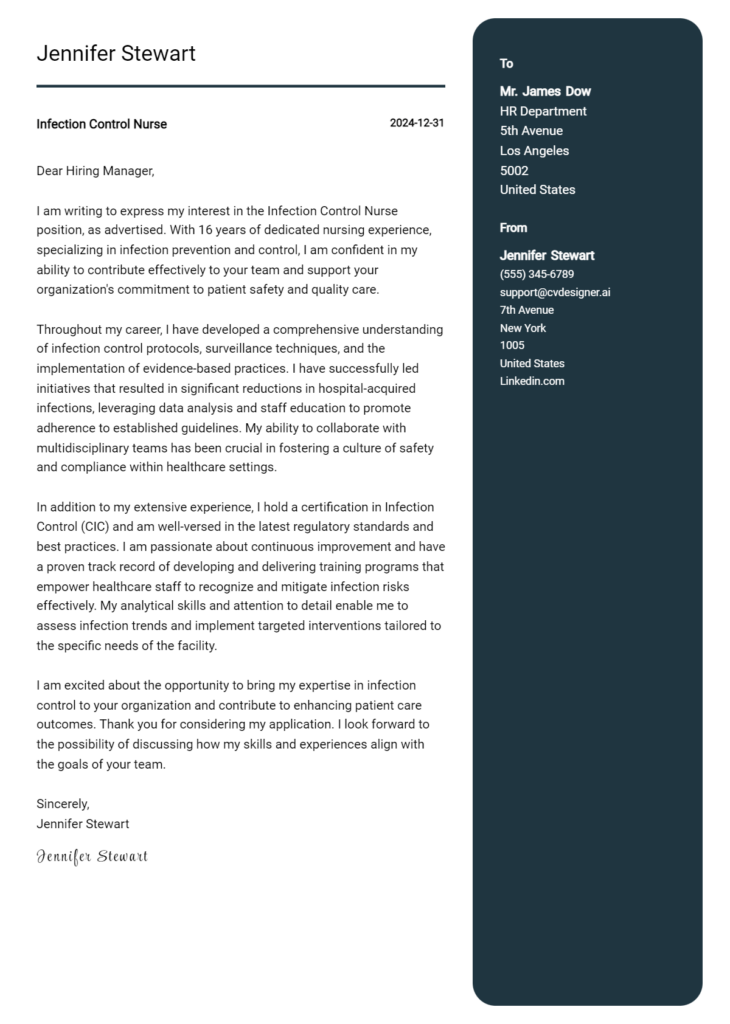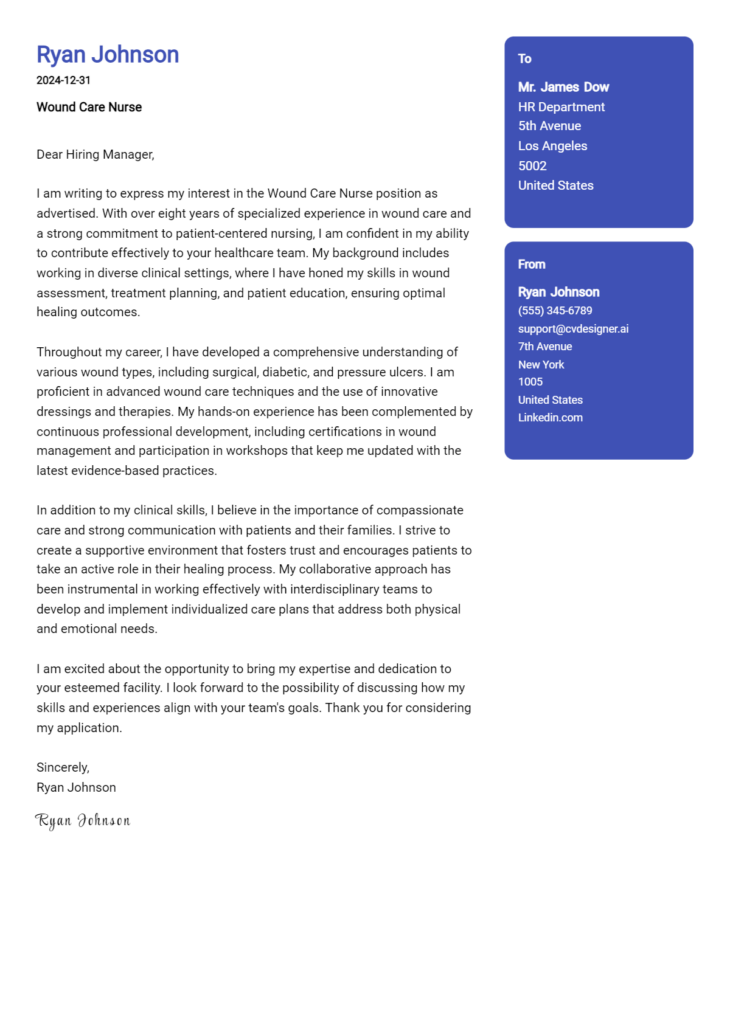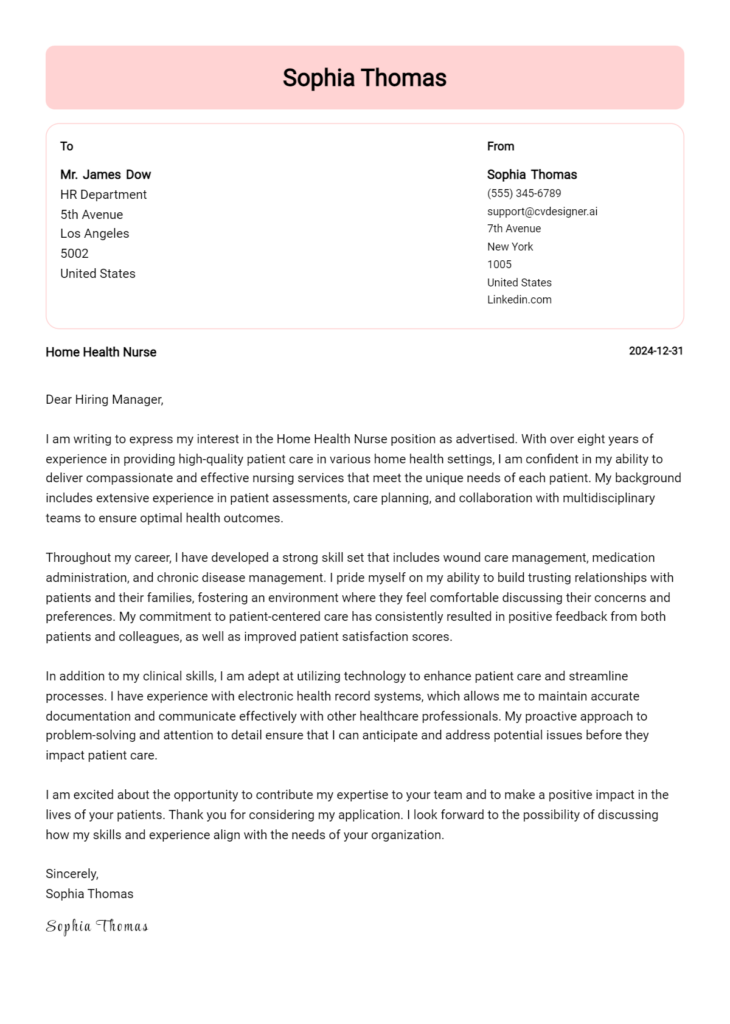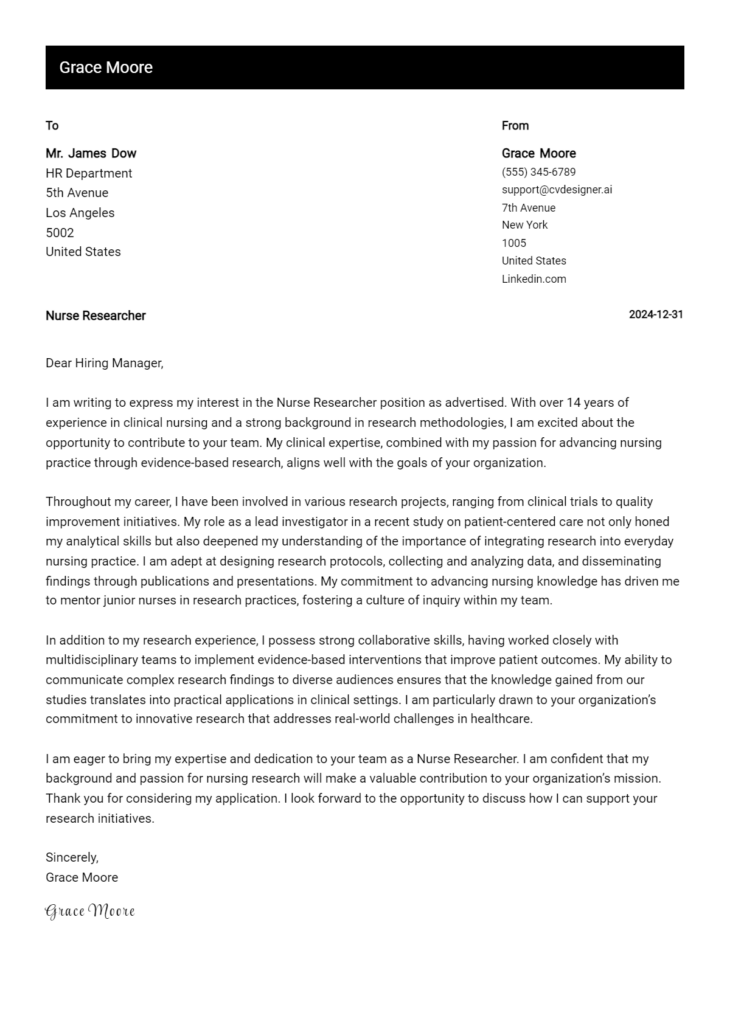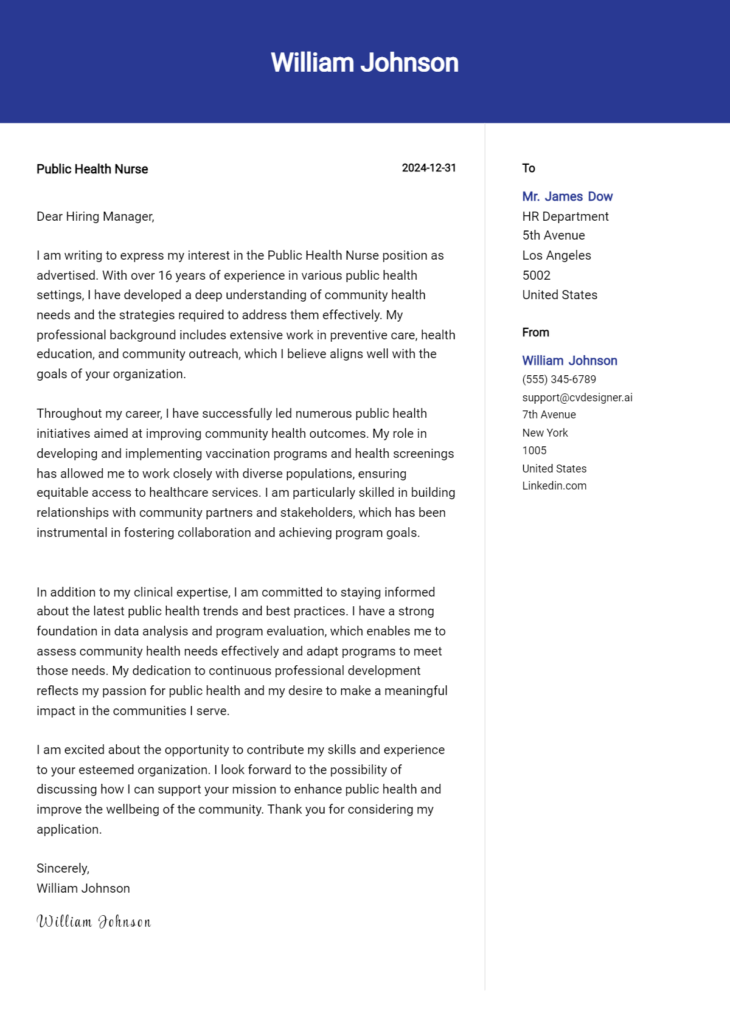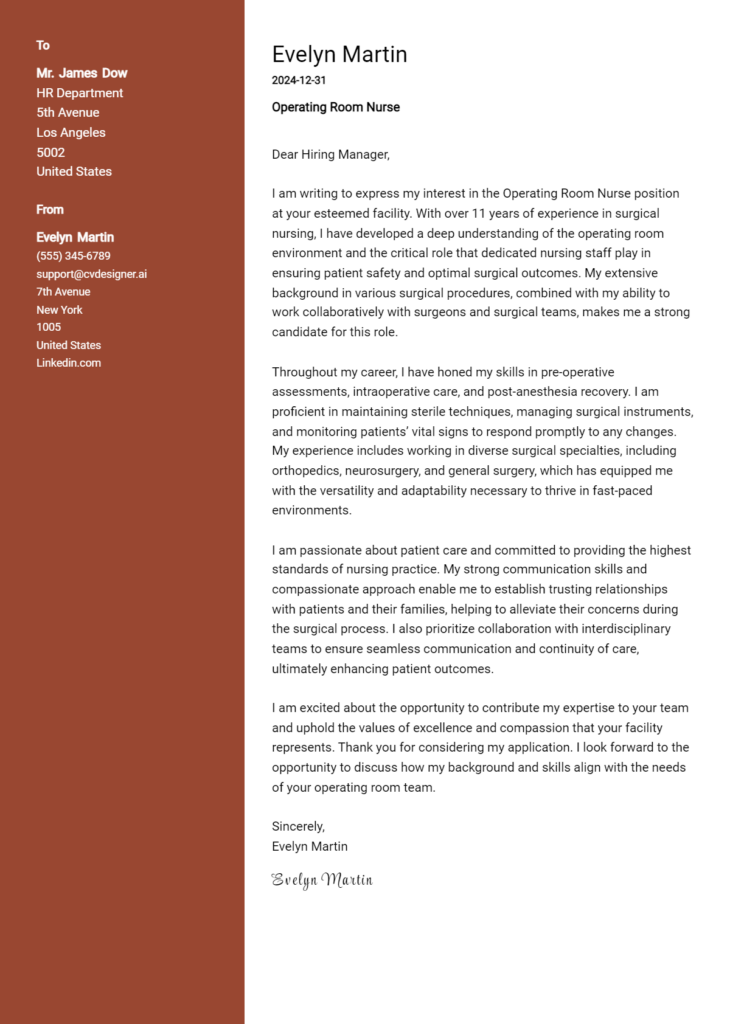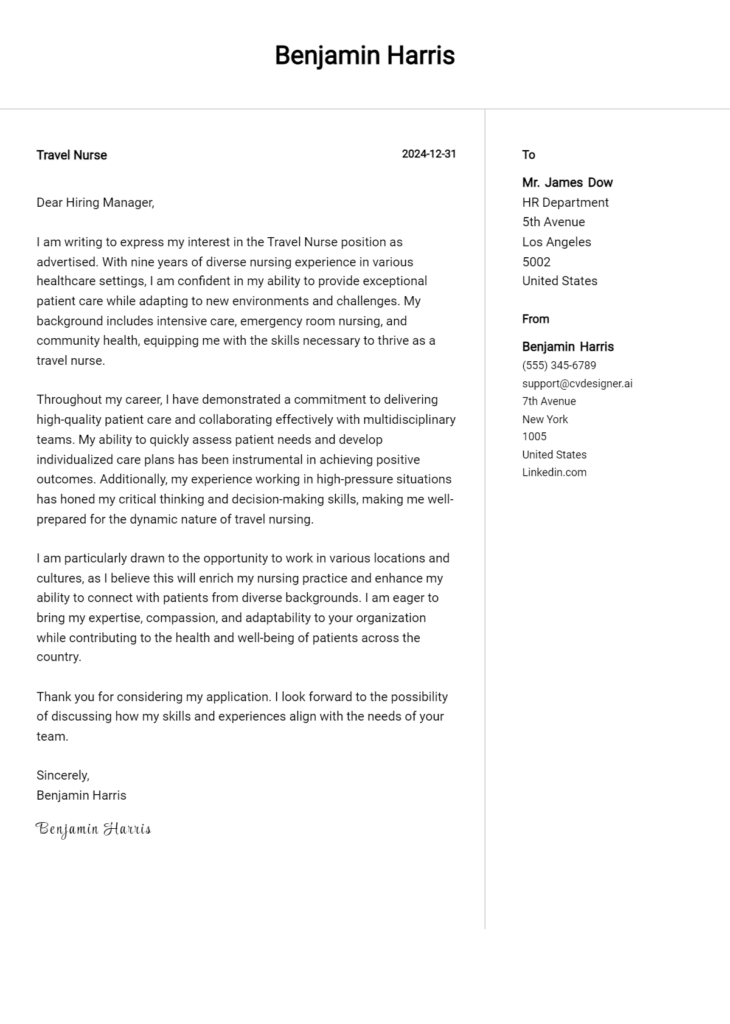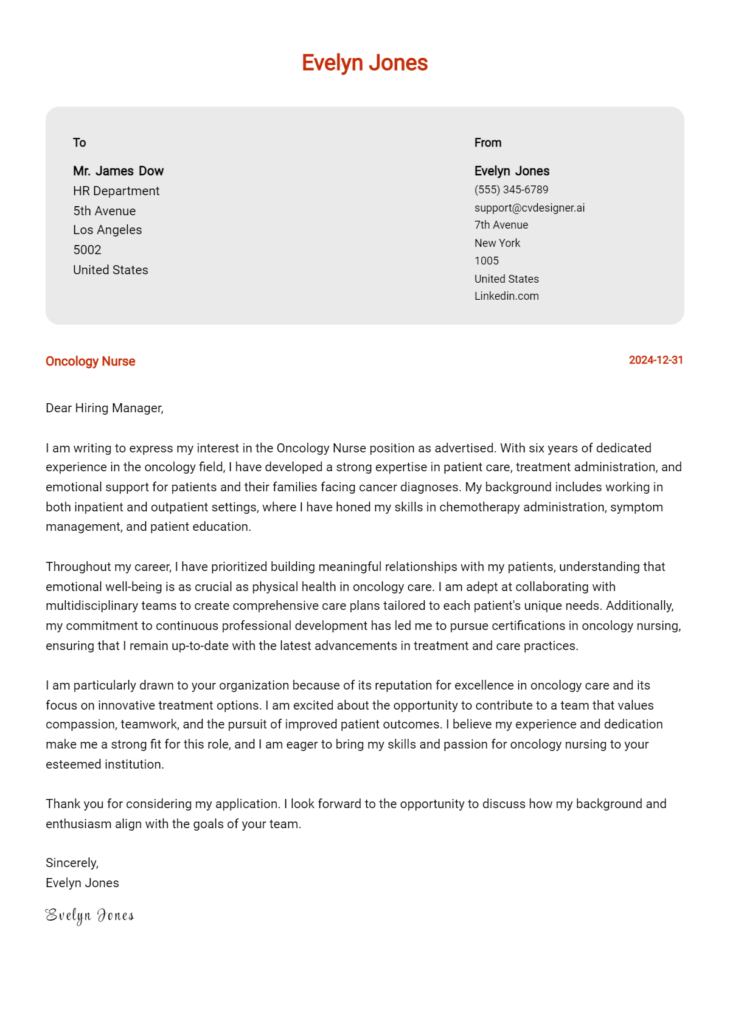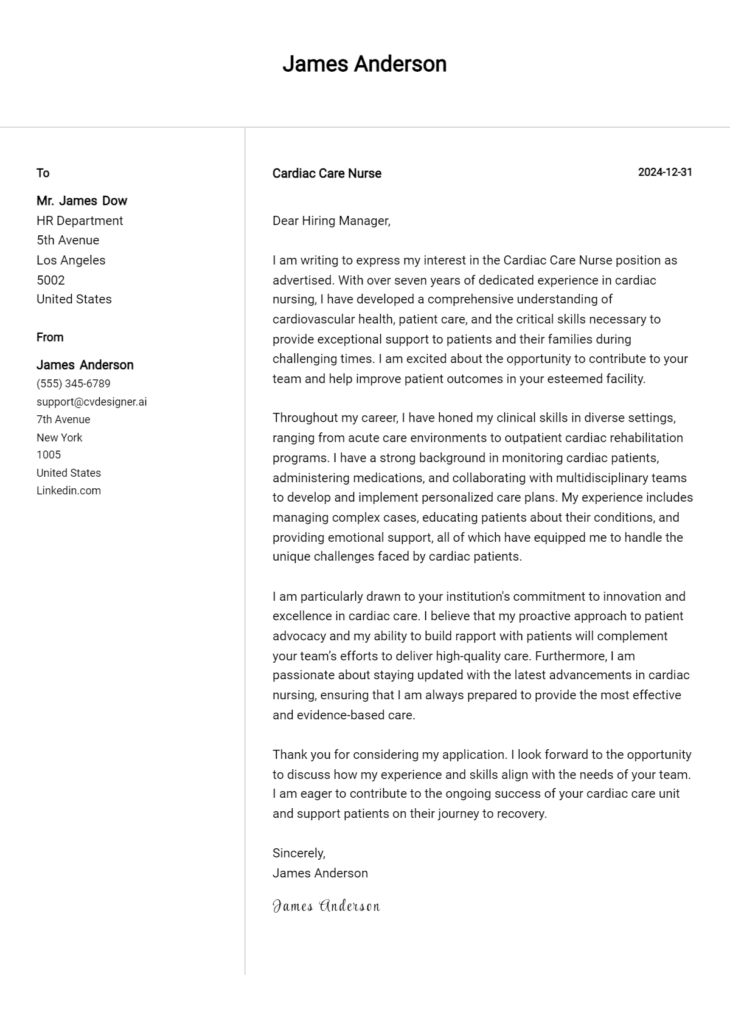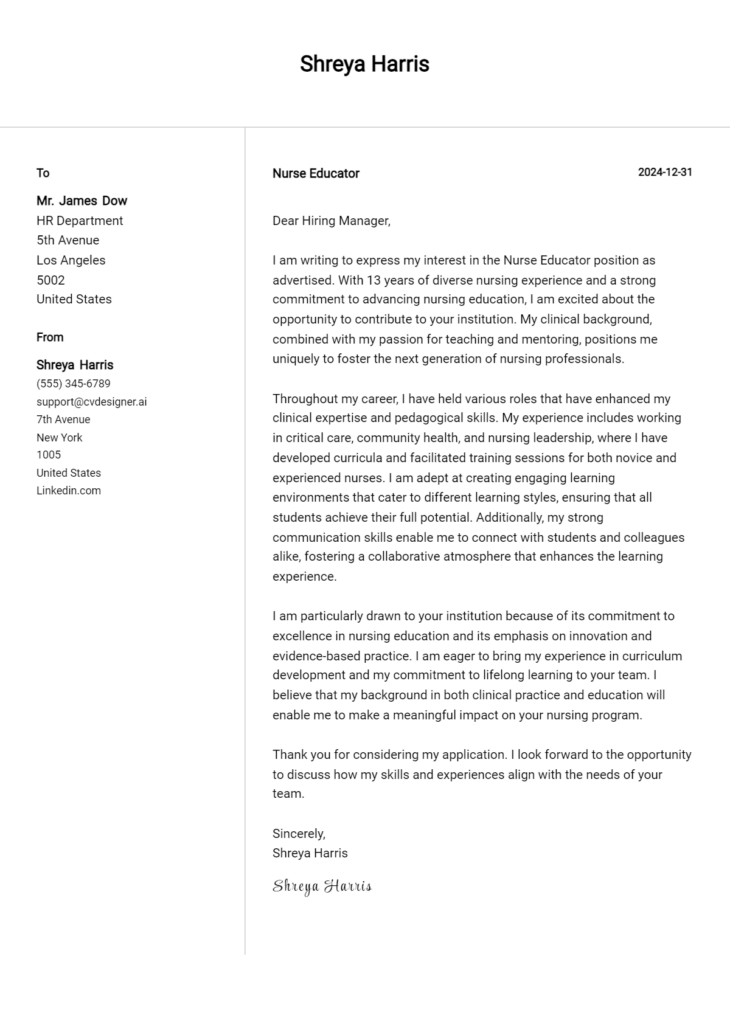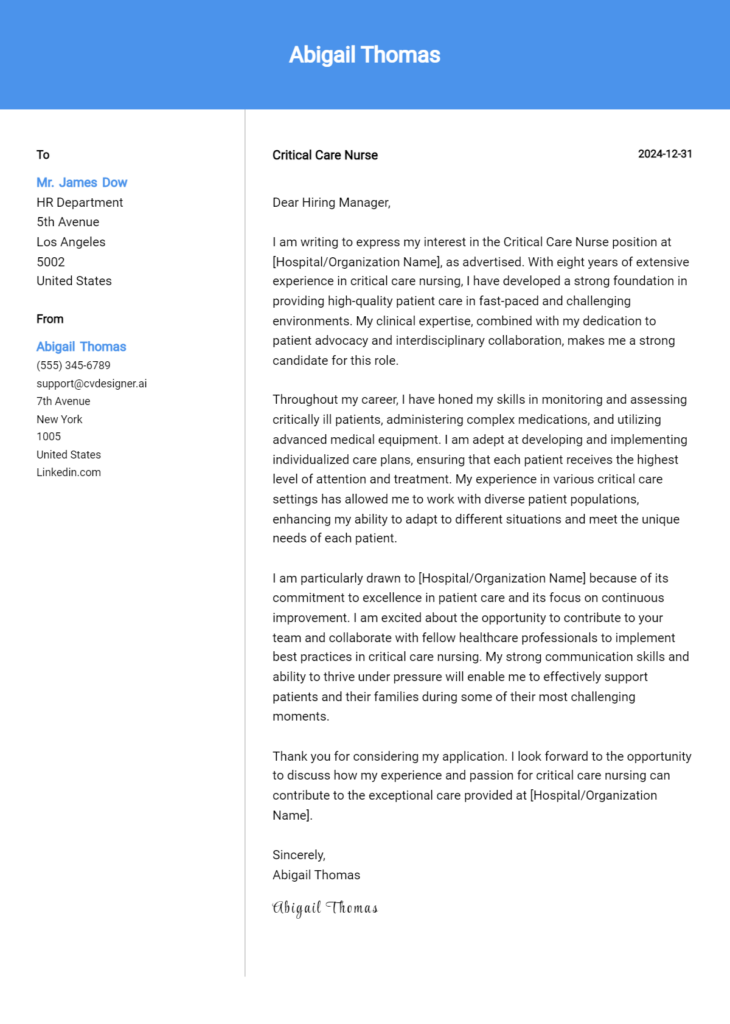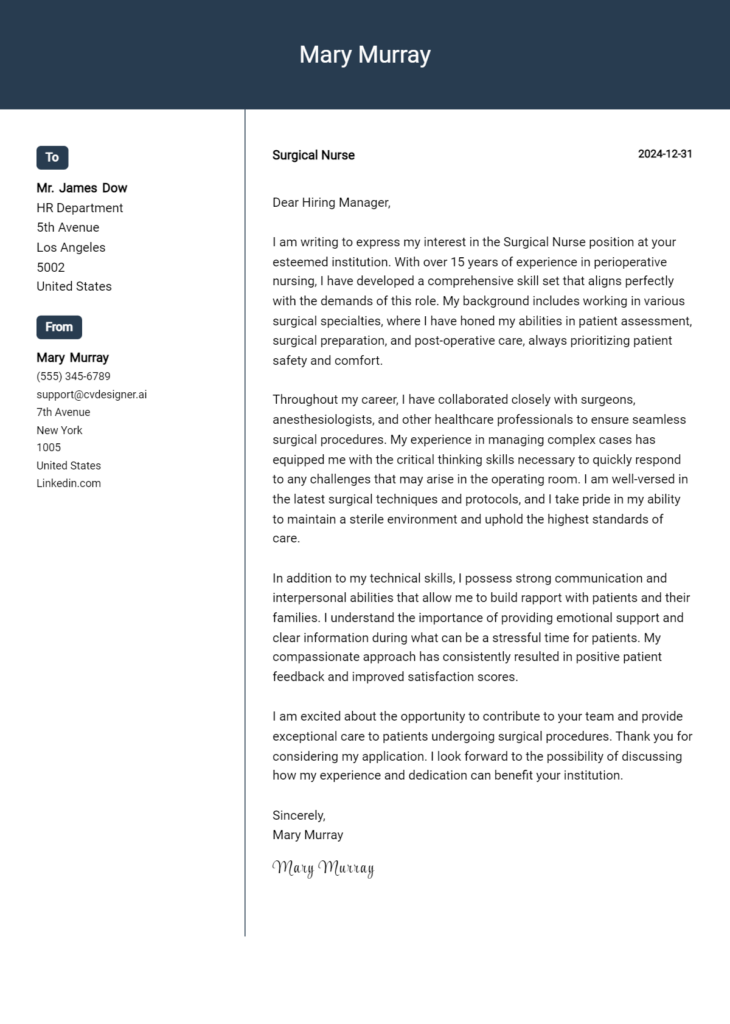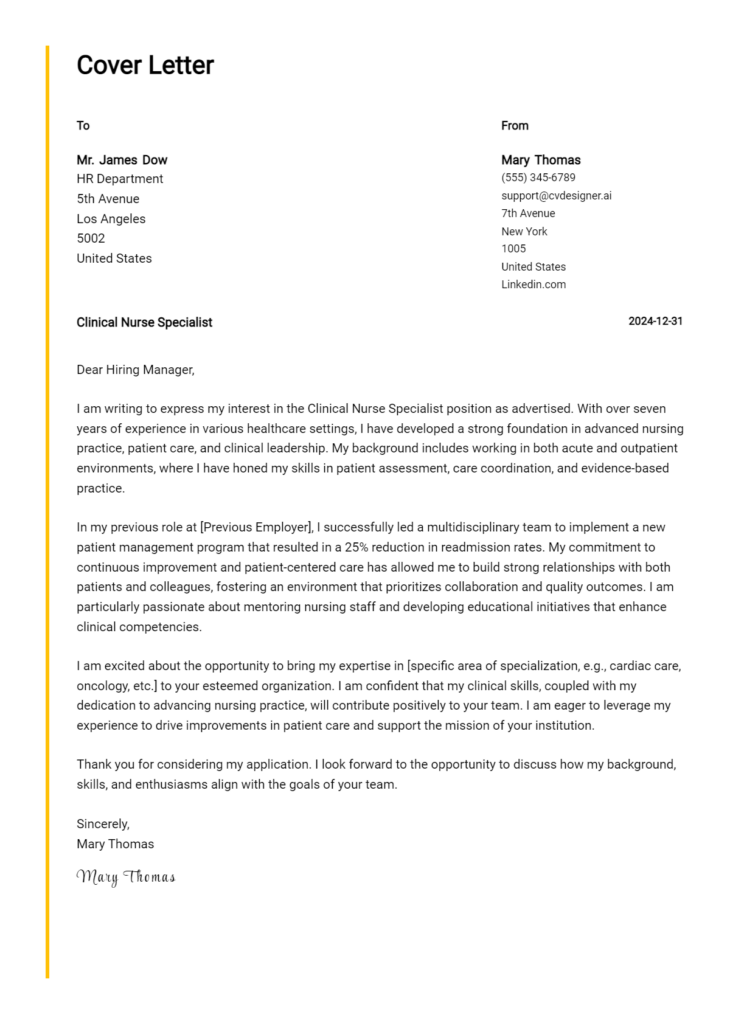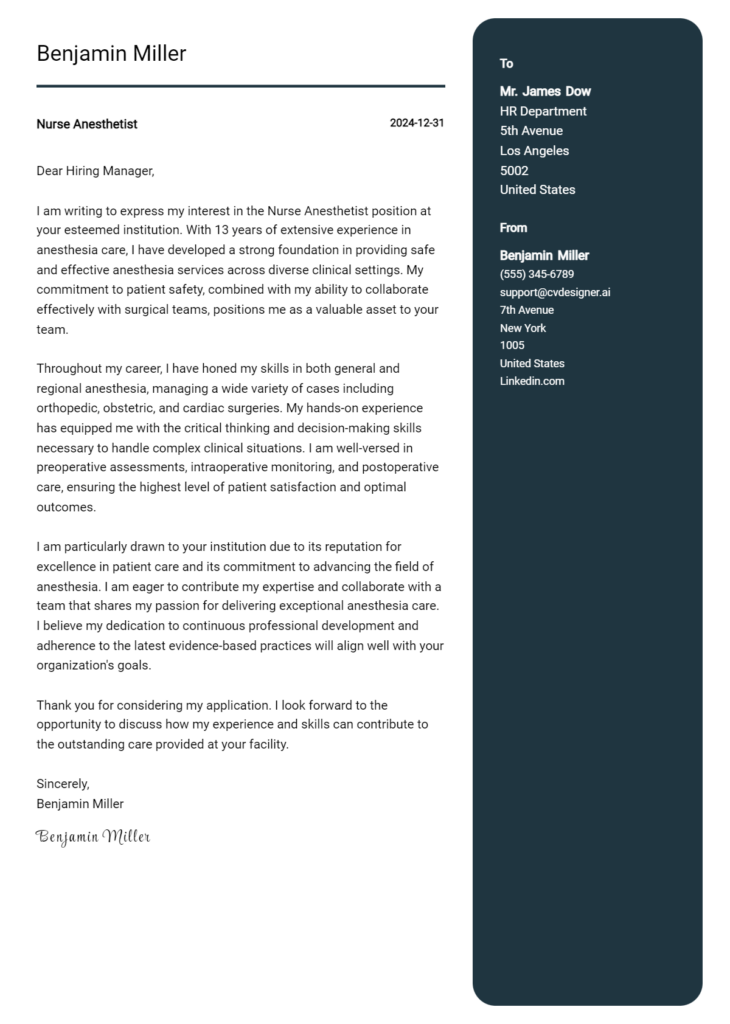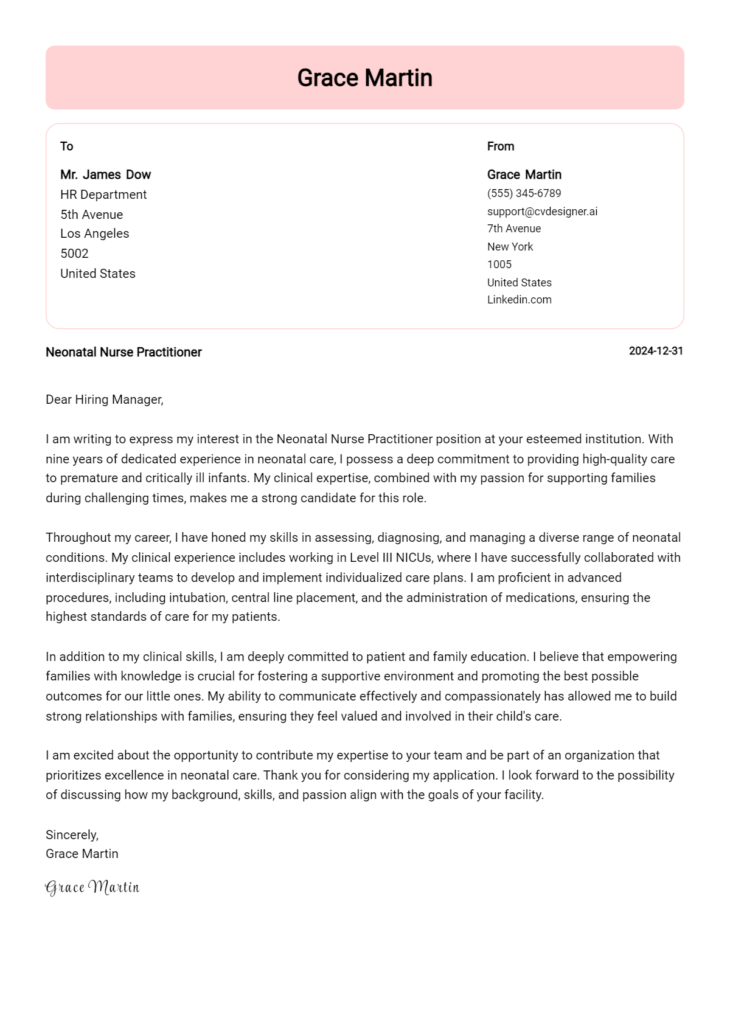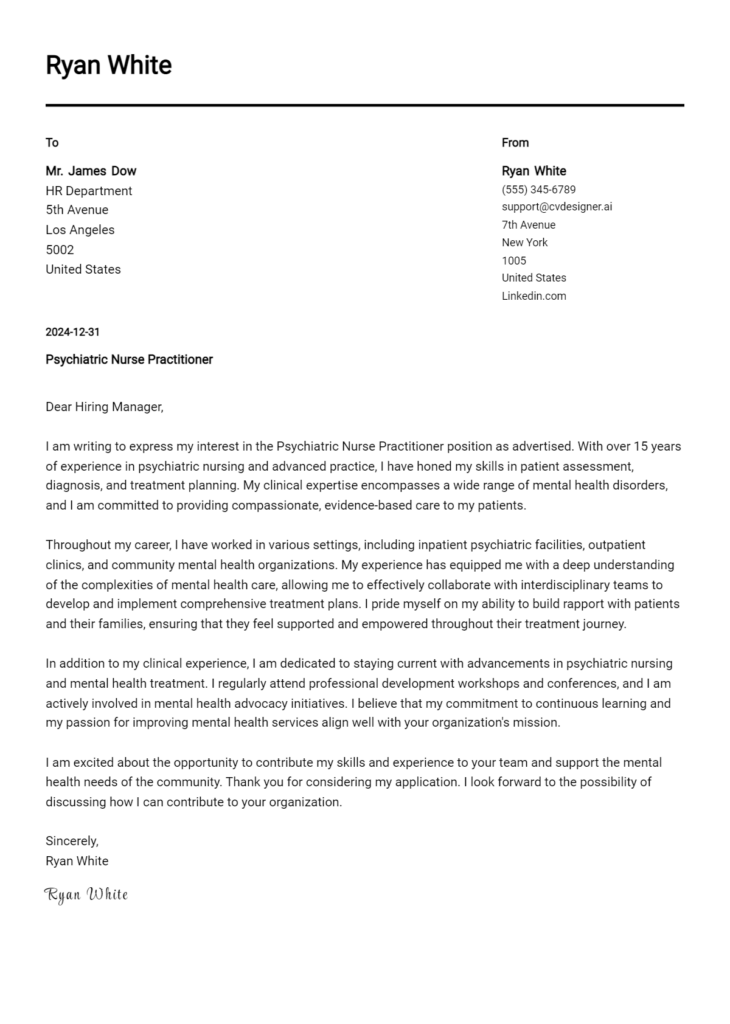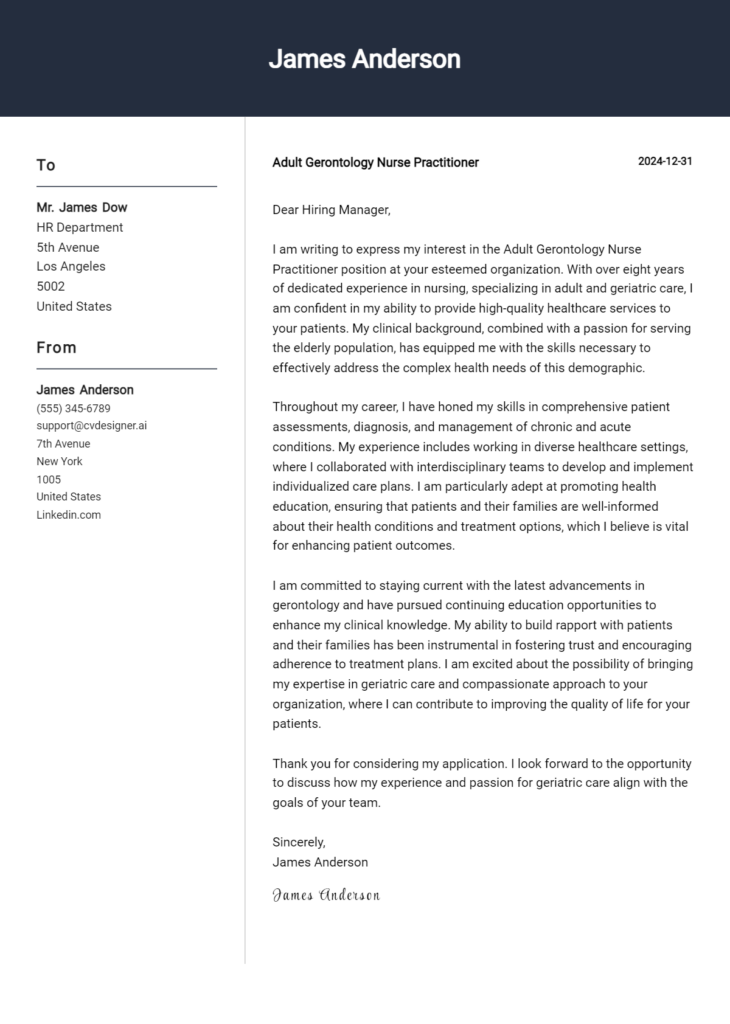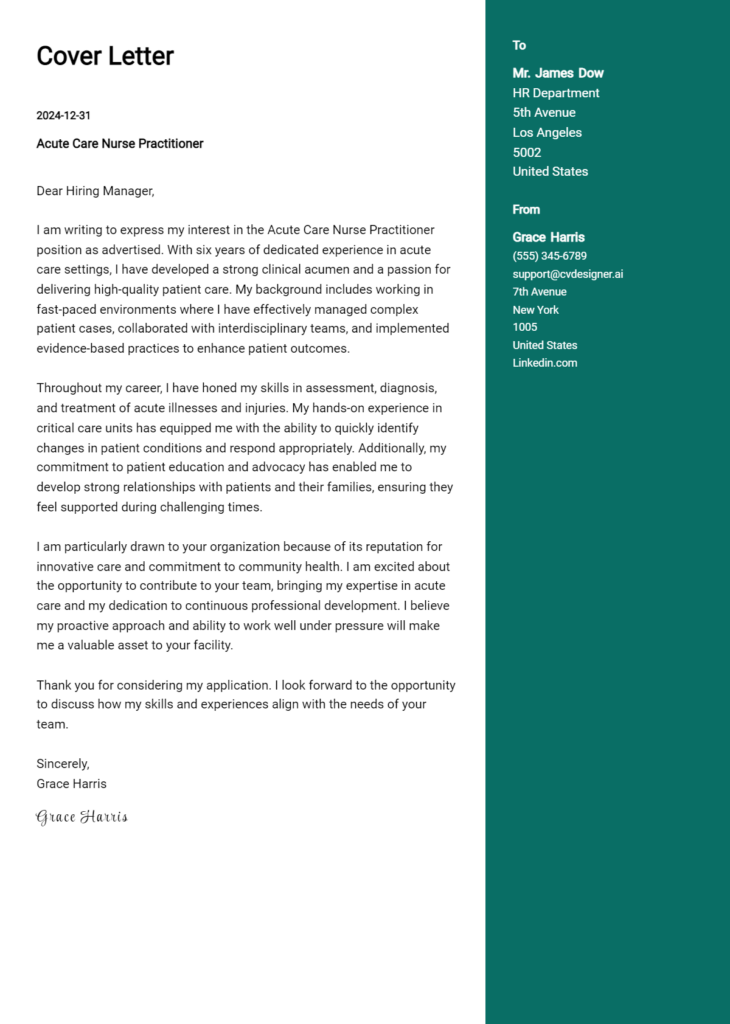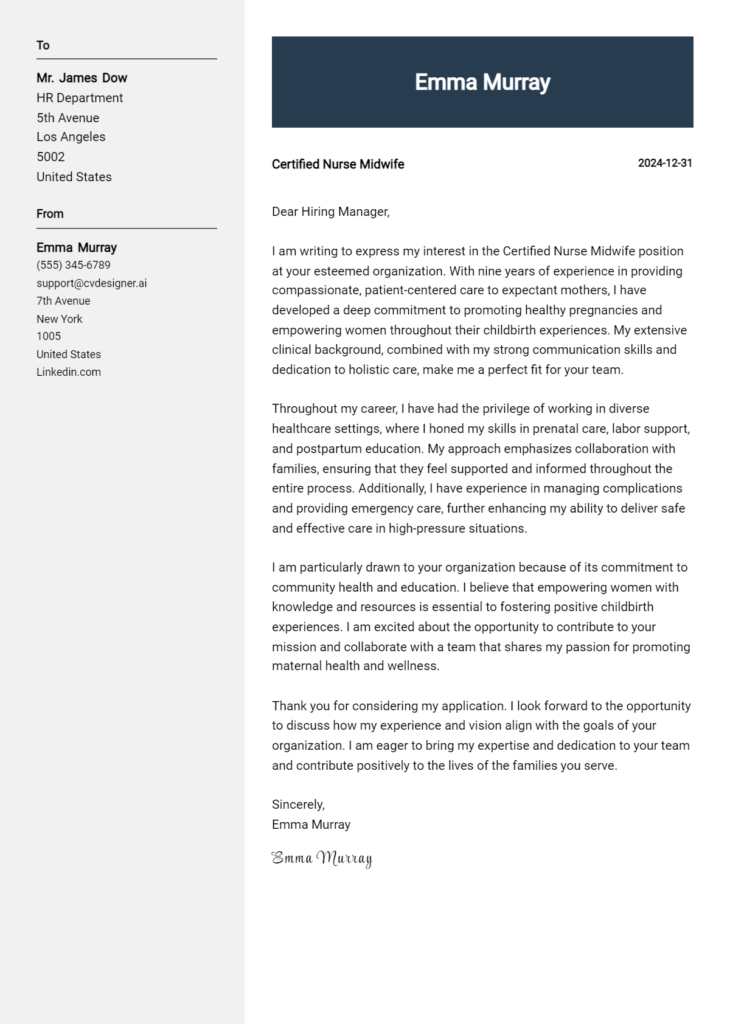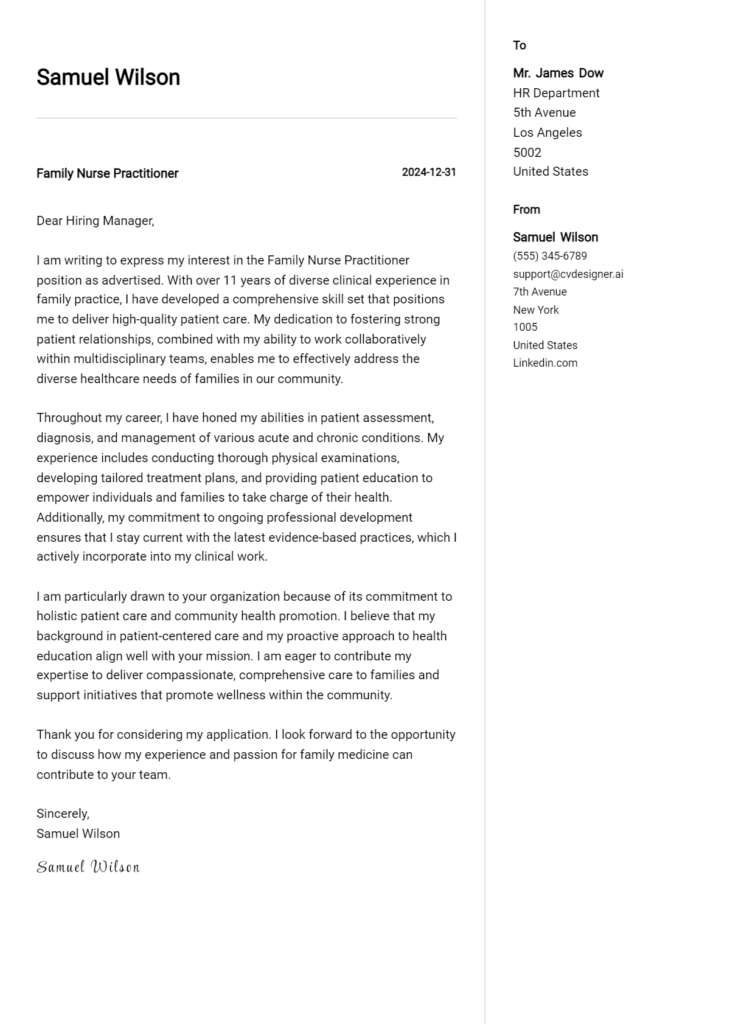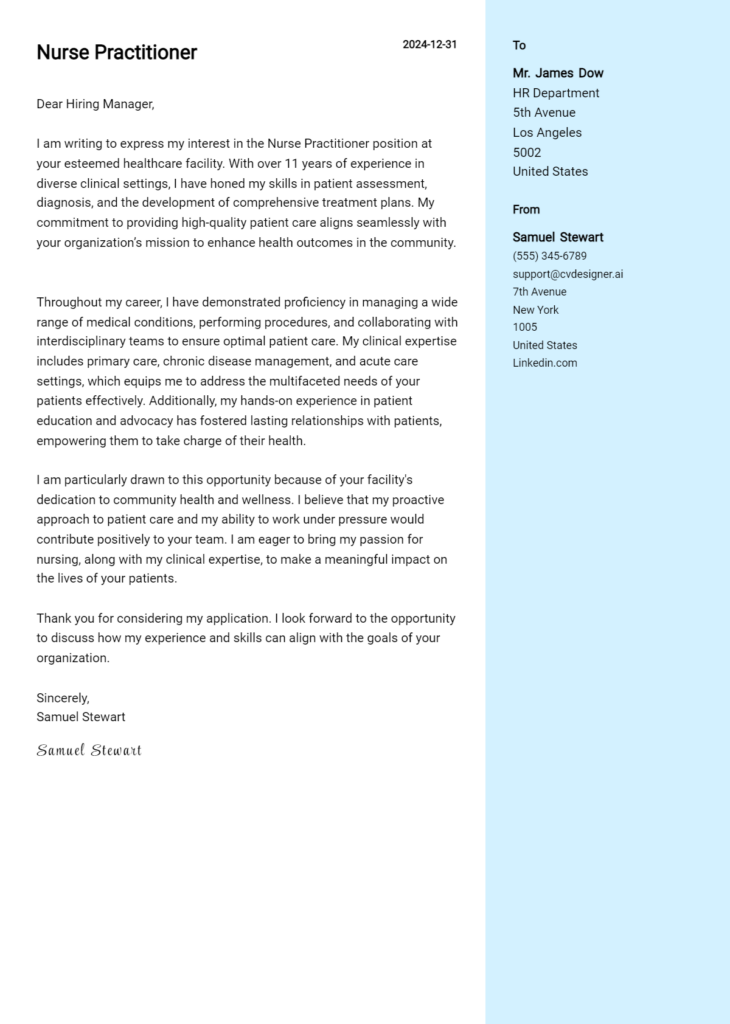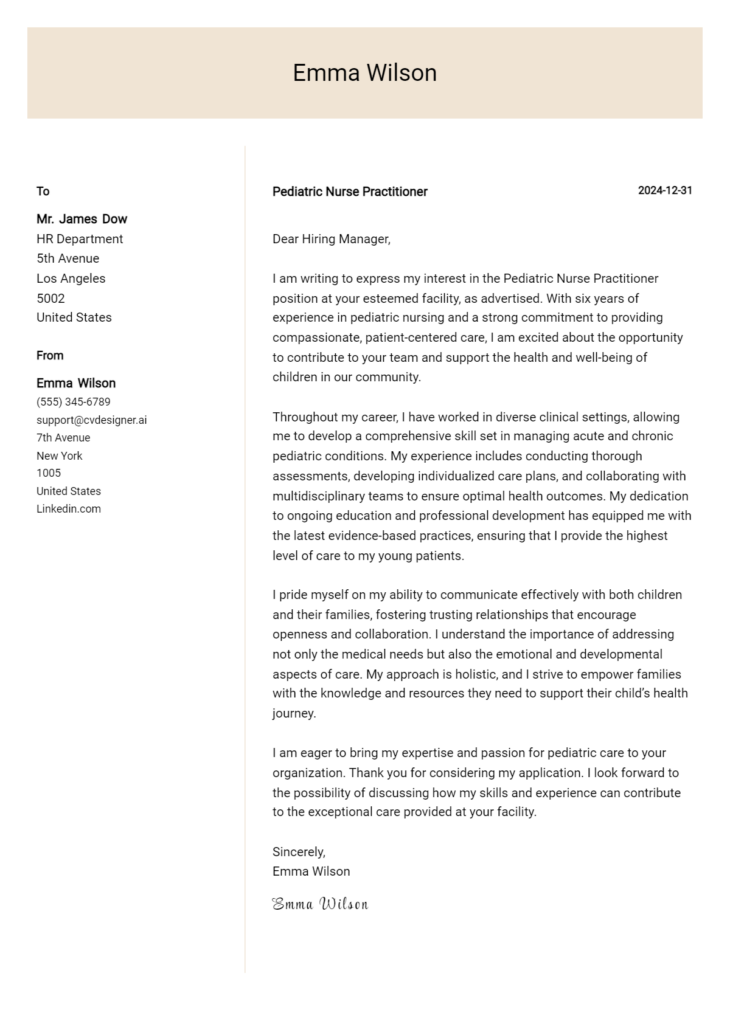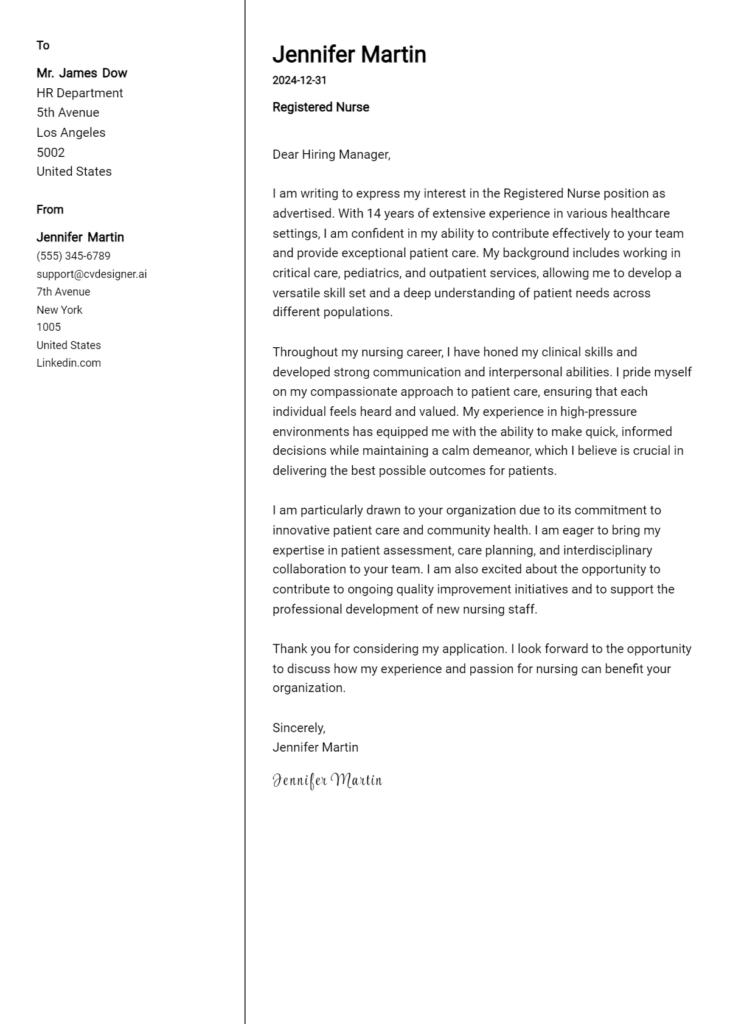Emergency Room Nurse Cover Letter Examples
Explore additional Emergency Room Nurse cover letter samples and guides and see what works for your level of experience or role.
How to Format an Emergency Room Nurse Cover Letter
Crafting an effective cover letter is crucial for an Emergency Room Nurse, as it serves as your first opportunity to make a lasting impression on potential employers. The way you format your cover letter not only showcases your qualifications but also reflects your ability to communicate clearly and efficiently—skills that are essential in a fast-paced emergency room environment. A well-structured cover letter can help capture the hiring manager's attention, demonstrating your professionalism and readiness to handle the demands of the job.
In this guide, we'll outline how to structure your cover letter, providing insights and nurse-specific examples to help you create a compelling document.
We'll focus on the essential components of a professional cover letter, including:
- Cover Letter Header
- Cover Letter Greeting
- Cover Letter Introduction
- Cover Letter Body
- Cover Letter Closing
Each section plays a vital role in presenting your qualifications and showcasing your commitment to patient care. Let’s break down each part and explain how to make your emergency room nurse cover letter stand out.
Importance of the Cover Letter Header for an Emergency Room Nurse
The cover letter header is a critical component of your application as an Emergency Room Nurse. It serves as the first impression and sets the tone for the rest of your letter. A clear and professional header not only provides essential information such as your contact details, the date, and the recipient's information, but it also demonstrates your attention to detail and professionalism—qualities that are vital in a high-pressure environment like the emergency room. A well-structured header ensures that your letter is easy to read and helps the hiring manager quickly identify who you are and how to reach you.
Strong Example:
Jane Doe 123 Healthcare Lane Cityville, ST 12345 jane.doe@email.com (123) 456-7890 October 5, 2023 Mr. John Smith Director of Nursing Cityville General Hospital 456 Medical Blvd Cityville, ST 12345
Weak Example:
Hi, My name is Jane, I’m applying for the ER nurse job. 10/5/23
The Importance of the Cover Letter Greeting for an Emergency Room Nurse
The greeting of your cover letter serves as the first impression for the hiring manager and sets the tone for the rest of your application. A well-crafted greeting demonstrates professionalism and personalizes your approach, showing that you value the opportunity and respect the recipient. Addressing the hiring manager directly creates a connection and indicates that you have taken the time to research the organization and its team. To avoid generic greetings such as "To Whom It May Concern," aim to find the hiring manager's name through the company's website, LinkedIn, or by calling the organization. This small effort can make a significant difference in how your cover letter is received.
Strong Greeting Example
Dear Ms. Johnson,
Weak Greeting Example
To Whom It May Concern,
The Importance of a Strong Cover Letter Introduction for an Emergency Room Nurse
A well-crafted cover letter introduction is crucial for any job application, especially for a role as demanding as an Emergency Room Nurse. This section serves as your first impression, and it should effectively capture the hiring manager's attention while expressing your genuine interest in the position. A strong introduction not only highlights your enthusiasm for the role but also showcases your key skills and achievements relevant to the fast-paced environment of an emergency room. In this way, the hiring manager is immediately drawn to your qualifications and eager to learn more about your candidacy.
Strong Example
Dear Hiring Manager, As a passionate and dedicated Emergency Room Nurse with over five years of experience in high-pressure medical environments, I am excited to apply for the ER Nurse position at [Hospital Name]. My proven ability to provide exceptional patient care, coupled with my expertise in rapid assessment and crisis intervention, aligns perfectly with the needs of your team. I am eager to contribute my skills and commitment to excellence in patient outcomes at [Hospital Name].
Weak Example
Hi, I am writing to apply for the Emergency Room Nurse job. I have some experience in nursing, and I think I would be a good fit for your hospital. Thank you for considering my application.
Purpose of the Cover Letter Body for an Emergency Room Nurse
The body of a cover letter for an Emergency Room Nurse serves as a critical component that allows candidates to effectively articulate their unique skills, experiences, and the value they bring to the healthcare team. It is an opportunity to highlight relevant clinical competencies, such as proficiency in emergency care protocols, experience with trauma cases, or involvement in specific projects that improved patient outcomes. By detailing accomplishments, such as successfully managing a high-stress situation or contributing to a quality improvement initiative, candidates can demonstrate their ability to thrive in a fast-paced environment. This section is essential as it not only showcases qualifications but also conveys the candidate's passion for emergency medicine and commitment to patient care.
Strong Example
As an Emergency Room Nurse with over five years of experience in a Level 1 trauma center, I successfully led a team in implementing a new triage protocol that reduced patient wait times by 30%. My role involved training staff on the updated procedures and closely monitoring outcomes, which resulted in improved patient satisfaction scores. Additionally, I spearheaded a project that integrated mental health assessments into the emergency care process, ensuring that patients received holistic treatment. This experience has equipped me with the skills to provide high-quality, compassionate care in a fast-paced environment, and I am eager to bring my expertise to your esteemed team.
Weak Example
I have worked as an Emergency Room Nurse for a few years and have dealt with many patients. I am good at my job and can handle stress. I think I would be a great addition to your team. I have done some training and have seen a lot of different cases. I hope to work with you.
Importance of the Cover Letter Closing for an Emergency Room Nurse
The closing paragraph of a cover letter is crucial as it serves to summarize the candidate's qualifications, reiterate their interest in the position, and encourage the hiring manager to take the next steps, such as reviewing the resume or scheduling an interview. A strong closing leaves a lasting impression and reinforces the candidate's enthusiasm for the role, while a weak closing can diminish the overall impact of the application.
Strong Example
Thank you for considering my application for the Emergency Room Nurse position at [Hospital Name]. With my extensive experience in fast-paced emergency settings and a strong commitment to patient care, I am excited about the opportunity to contribute to your team. I look forward to discussing how my skills can support your mission in providing exceptional healthcare. Please feel free to reach out to schedule an interview at your convenience. I have attached my resume for your review.
Weak Example
Thanks for reading my cover letter. I hope you like my resume. I am interested in the job, and it would be cool if we could talk more about it. Let me know if you want to set up a meeting.
Crafting an effective cover letter is a crucial step for candidates aspiring to become Emergency Room Nurses. This document serves as a personal introduction, allowing you to showcase not only your qualifications but also your passion for patient care and resilience in high-pressure situations. It’s essential to highlight your technical skills, problem-solving abilities, knowledge of the Software Development Life Cycle (SDLC), teamwork experience, and a commitment to continuous learning. The following tips will guide you in creating a compelling cover letter that stands out to potential employers.
Tips for Writing an Effective Cover Letter for Emergency Room Nurse
Highlight Your Technical Skills
Emergency Room Nurses must possess a range of technical skills, from proficiency in monitoring equipment to administering medications. Begin your cover letter by emphasizing these skills. Mention specific equipment or techniques you are familiar with and how they have been instrumental in your previous roles. This not only demonstrates your qualifications but also reassures employers of your readiness for the demands of the ER.Showcase Problem-Solving Abilities
The ability to think quickly and make sound decisions is critical in emergency settings. Share a specific example of a challenging situation you faced in your nursing career and describe how you resolved it. Use this anecdote to illustrate your critical thinking skills and ability to remain calm under pressure, reinforcing your suitability for the fast-paced environment of an emergency room.Incorporate Your Knowledge of SDLC
While it may not seem directly related, understanding the Software Development Life Cycle can be beneficial, especially if you worked with electronic health records (EHR) or other healthcare technologies. Briefly explain how your knowledge of SDLC has helped improve processes in your previous positions, demonstrating your ability to bridge clinical practices with technology to enhance patient care.Emphasize Teamwork Experience
Collaboration is vital in an emergency room setting. Use your cover letter to highlight your experience working as part of a multidisciplinary team. Describe how you’ve effectively communicated with physicians, specialists, and support staff to ensure comprehensive patient care. This illustrates your ability to work harmoniously in a team-oriented environment, which is essential for success in the ER.Express Your Passion for Continuous Learning
The healthcare field is ever-evolving, and a commitment to continuous learning is crucial for an Emergency Room Nurse. Mention any additional certifications, courses, or training you’ve pursued to stay updated with the latest practices and technologies. This demonstrates your dedication to professional growth and your proactive approach to providing the best patient care possible.
For further assistance, you can explore various cover letter templates or utilize a cover letter builder to streamline your writing process and create a polished final product.
Common Mistakes to Avoid in an Emergency Room Nurse Cover Letter
Crafting a compelling cover letter is essential for standing out as an Emergency Room Nurse candidate. Avoiding common mistakes can significantly enhance your chances of landing an interview. Here are some pitfalls to watch out for:
Generic Greetings: Starting with "To whom it may concern" can signal a lack of effort. Always try to address the hiring manager by name.
Lack of Specificity: Failing to mention specific experiences or skills relevant to the emergency room can make your application forgettable. Tailor your letter to highlight pertinent certifications and experiences.
Too Much Jargon: While nursing has its own language, using excessive medical jargon can alienate readers. Keep it professional yet accessible.
Neglecting Formatting: A poorly formatted cover letter can detract from your professionalism. Refer to proper cover letter format guidelines to ensure clarity and organization.
Typos and Grammatical Errors: Mistakes can undermine your attention to detail, a critical quality in nursing. Always proofread and consider using tools to spot errors.
Overly Long Letters: Cover letters should be concise and to the point. Aim for a length of one page to maintain the hiring manager's attention.
Failure to Connect Personal Skills to Job Requirements: Highlight how your personal qualities, like empathy and resilience, align with the demands of ER nursing. This connection can make your letter more compelling.
By steering clear of these common missteps and utilizing cover letter examples for inspiration, you can create a powerful cover letter that effectively showcases your qualifications and passion for emergency nursing.
Cover Letter FAQs for Emergency Room Nurse
What should I include in my cover letter as an Emergency Room Nurse?
In your cover letter, it’s crucial to highlight your relevant experience, skills, and passion for emergency care. Start with a strong introduction that states your interest in the position and briefly mentions your qualifications. Include specific examples of your experience in high-pressure environments, such as managing trauma cases, triaging patients, or working with diverse medical teams. Emphasize your certifications, such as ACLS or PALS, and your ability to stay calm under pressure. Also, mention your commitment to patient care and how your personal values align with the hospital's mission. Conclude with a strong closing statement expressing your enthusiasm for the position and your eagerness to contribute to the team.
How can I demonstrate my skills in a cover letter?
To effectively demonstrate your skills in your cover letter, use the STAR method (Situation, Task, Action, Result) to illustrate your experiences. For example, describe a specific situation where you had to make quick decisions in a critical care scenario. Outline the task you needed to accomplish, the actions you took, and the positive outcomes that resulted from your intervention. Be sure to showcase both hard skills (like IV administration or EKG interpretation) and soft skills (such as communication and teamwork). Quantify your achievements whenever possible, like "successfully managed a team of nurses during a 12-hour shift with a 20% increase in patient satisfaction ratings." This approach provides concrete evidence of your capabilities and demonstrates your problem-solving skills.
Should I tailor my cover letter for each job application?
Absolutely! Tailoring your cover letter for each job application is essential. It shows the employer that you have a genuine interest in their organization and that you've taken the time to understand their specific needs. Research the hospital's mission, values, and any recent initiatives they’ve undertaken, and incorporate this information into your letter. For instance, if the hospital emphasizes a commitment to trauma care, highlight your relevant experiences in trauma situations. Additionally, use keywords from the job description to align your qualifications with what they are seeking. A customized cover letter not only makes you stand out among other candidates but also demonstrates your dedication and professionalism.
What is the ideal length for a cover letter?
The ideal length for a cover letter is typically one page, consisting of three to four paragraphs. Aim for around 250-400 words to provide ample detail without overwhelming the reader. Start with a compelling introduction that grabs attention, followed by the main body sections where you outline your qualifications and experiences. Each paragraph should be concise yet informative, focusing on your most relevant skills and achievements. Avoid lengthy sentences and unnecessary jargon; clarity and directness are key. Finally, conclude with a strong statement expressing your enthusiasm for the role and an invitation for further discussion. Keeping your cover letter concise ensures that it is easily digestible for hiring managers who may be reviewing multiple applications.
Build your Cover Letter in minutes
Use an AI-powered cover letter builder and have your letter done in 5 minutes. Just select your template and our software will guide you through the process.

